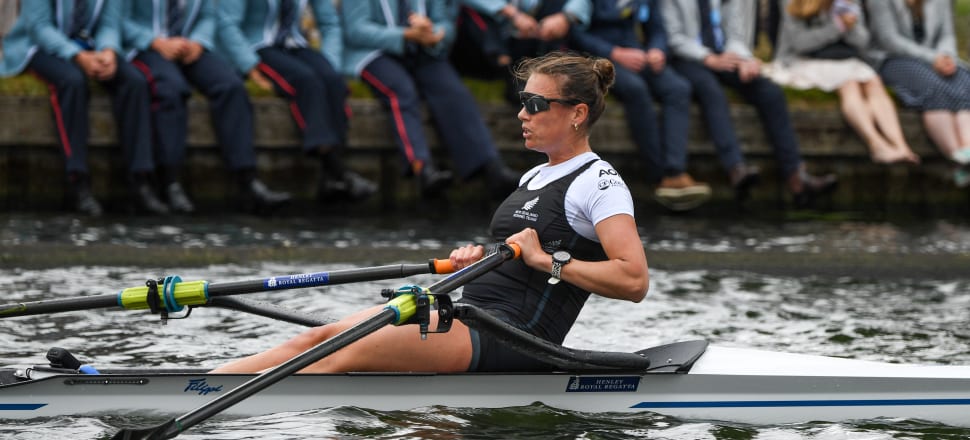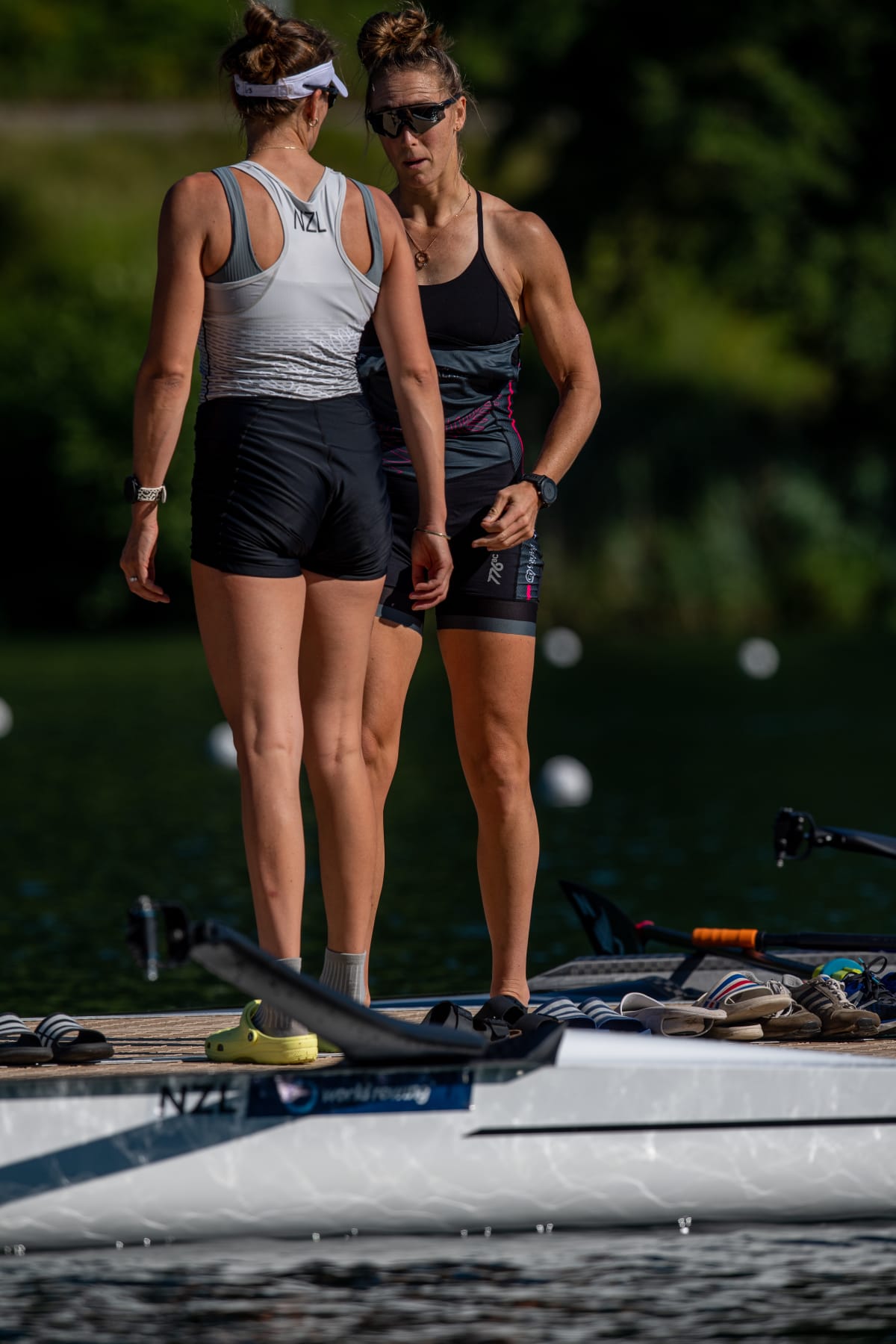
Our top women rowers have, until now, been lost to the sport once they start a family. But Olympic silver medallist Lucy Spoors is leading a revolution in a rigid system to ensure athlete mums can return to the boat. Suzanne McFadden writes.
Lucy Spoors remembers her worst days out on Lake Karapiro; the “miserable sessions” as they've come to be known.
On Wednesdays and Saturdays, New Zealand’s elite rowers do ‘squad pieces’ – where everyone in the squad races each other. Competitive as hell. Sapping at the best of times.
But even worse when you have severe morning sickness.
“We put ourselves in a position where we’re only going out to win,” Olympic eights silver medallist Spoors says. “But I got on the water already feeling sick.
“I remember regretting every time I stopped in between the pieces – that’s when the nausea and vomiting hit me like a ton of bricks. It was like being out at sea.”
Spoors was in the second trimester of her pregnancy, and determined to race and train as long as she physically could – with the guidance, of course, of Rowing NZ’s performance support team. But the all-day morning sickness was really testing her resolve – vomiting up to 10 times a day well into her pregnancy.
“In between pieces, I was out there swallowing down vomit, and trying to figure out what I could eat to hold down for the next race,” the former world champion says.
“Normally on the water I have gels, but they weren’t an option. One day I took out a full packet of digestive biscuits and white bread peanut butter sandwiches. There was lots of experimenting.”
Spoors is now in the final weeks of her pregnancy, and ready for her son to arrive any day. “I’m looking forward to being on the other side,” she laughs.
On the “other side”, she hopes to be both a mum and a competitive rower, with the 2024 Paris Olympics her goal. That will, obviously, all depend on what motherhood brings.
Rowing NZ call Spoors a trailblazer – their first elite athlete to continue training and racing during her pregnancy. And the sport hopes she won’t be the last.

They realise the importance of keeping women at the peak of their rowing careers still involved in the sport if they decide to have a family. And they want to support those rowers on either side of their pregnancy, especially as they prepare to get back out on the water.
Caroline MacManus, an exercise physiologist who’s now Rowing NZ’s head of athletic performance, says change is welcome in a system that’s been “rigid for so long”.
“While it’s been successful, it doesn’t mean it can’t be done another way. That we can’t embrace mothers at the same time,” she says.
“It’s a very centralised programme that's never catered for anything outside the centralised model. But we’re in a world now where we have to look at change.
“Lucy had no desire to stop, so why stop? I do think we’ve probably lost some women who’ve left the programme at the peak of their physical and mental racing condition, because it wasn’t an option for them. So it’s an exciting time to change that.”
MacManus has worked closely with Spoors throughout her pregnancy, helping her get to Europe back in June and row at the Henley Royal Regatta when she was 17 weeks pregnant.
She was then ready to race in the World Cup in Lucerne, in the double scull with Olympic single sculls champion Emma Twigg. But it was Twigg who was unable to row, coming down with Covid.
Working with Rowing NZ’s health lead, Dr Stu Armstrong, nutritionist Christel Dunshea-Mooij, strength and conditioning specialist Caleb Dobbs and MacManus, Spoors was able to set her own pace for training once she returned home.
“It’s something we always came back to, as we said to Lucy ‘Remember what your body has always been used to’. It makes most of it safe, even the racing,” she says.

But MacManus admits she doesn’t know how Spoors kept going at times when the nausea and vomiting left her drained.
“But you had the goal of the World Cups so you got out there,” MacManus says to Spoors during a video call. “But you’ve really had some miserable sessions out on the water.”
Looking back, Spoors also wonders how she managed it. “How did I put myself through that many hours a week in that state?” she says. “But at the time I was excited to be out there. I was like ‘This is so cool I have an opportunity to keep being me, and keep doing what I love with all my team-mates’.
***
Renowned for being fiercely competitive, Spoors was part of the New Zealand women’s eight who made history at the world championships in 2019, winning gold for the first time. At the Tokyo Olympics, she and her younger sister Phoebe were in the eights squad who won silver.
Straight after those Games, Lucy Spoors and her partner, Olympic men’s coxless pair rower Brook Robertson, decided to start a family. She wanted to be pregnant as soon as possible so she could have “a longer runway leading into Paris”.
She had an early miscarriage and then took longer to become pregnant again. “As athletes we’re used to asking our body to do something and it responding,” Spoors says.
“Initially I made two decisions. I didn’t want to end my rowing career, I didn’t feel I was done with rowing. I also didn’t want to be in a position whereas a woman I was making a choice to step away from my sport to start a family.
“The second decision was to be active through my pregnancy, but it wasn’t till I met with the doctor that I realised there was still a possibility of racing. It surprised me.”
She was around eight weeks pregnant when she sat down with Dr Stu Armstrong to figure out whether her training would decrease or continue towards the World Cup then 10 weeks away.
“He just said to me ‘Do you want to go?’ And of course I was like ‘If I can, yes’,” Spoors says.
“It was less adjustment in training than I thought. Everything was very safe. Probably most of the adjustment came because I was vomiting.” She worked on improving her pelvic floor strength and avoided weight-bearing exercises on her back.
Lucy Spoors at 18 weeks pregnant rowing in Switzerland
Spoors then hopped in a double scull with Twigg – who was also one of her best friends, and a new mum to son, Thomas, with her wife, Charlotte. She admits they talked a lot about pregnancy while they were training.
“I was so excited to be going on tour with Emma. I can’t imagine having done it without her – the support of a best friend and a new mum. It would have been very different without her there,” Spoors says.
***
Before the Tokyo Olympics, Rowing NZ’s general manager of performance, Judith Hamilton, took MacManus aside and said: “We really need to support women who want to start a family”.
“There’s a real organisational desire to make this work,” says MacManus. “To make touring easy with a family. That’s why Lucy is a trailblazer.”
MacManus worked with athlete mums while she was the performance scientist for Ireland’s national rowing team, but says she's always learning.
“I’ve worked with athletes who have had multiple babies in Ireland, but everyone is different. That’s the hard part for athletes too. You can’t plan too far ahead because things might change.
“The birth might change your return. Then there’s breastfeeding, and sleep. It’s very different for each woman and we have to respond to the individual athlete.
“We have to figure out how much training is enough, while allowing a lifestyle to embrace being a parent as well. It’s doable, and it’s going to be an education – not just for us, but for the coaches as well."
All of Rowing NZ's elite coaches are men, and while most are parents, it's still a big learning curve for them, MacManus says: "Especially in a programme where it’s never been the norm, or even an opportunity. Though we have plenty of male parents.” Sharing what she’s learning through the last eight months with the coaches is something Spoors is enjoying.

At 29 weeks, Spoors was still suffering from nausea, so she cut back her plan of training 10-12 hours a week on the rowing erg or stationary bike and switched to walking.
“We set 10-12 hours as a limit, not a target,” MacManus says. “Because there was no expectation of Lucy to be training. It’s her motivation to be active and have a health pregnancy. And your body is going to tell you how much you can do.”
Spoors has a return to fitness plan for the first three months after the birth of her baby boy.
“She may be ready earlier, or we might push it out a bit,” says MacManus. “The reassurance is that you can do that and get to a point in a few months of being internationally world class again.
“The first six weeks are all about bonding with your baby, and the generic advice is not to train then - a lot of that’s around the pelvic floor. We need to get a sign-off from specialists and then you can add to it bit by bit.
“I worked with an athlete in Ireland who was training three weeks after her fourth child because the Olympics weren’t far away. And she was able to do it.”
***
Spoors isn’t the only Olympic rowing medallist who's considering a return to the top of the sport with a baby in tow. Brooke Donoghue (now Francis, who won silver in the double scull in Tokyo) had daughter, Keira, 10 weeks ago. She and Spoors chat regularly.
“Everyone wants Brooke back into the programme, but we also want to give new mums the space to enjoy their time, and adjust to such a life-changing event,” MacManus says.

Spoors is also part of a Facebook group with other top Kiwi athletes who’ve recently had babies. “There’s heaps of information sharing, and no shortage of people to call on,” Spoors says. “It’s great to talk to women from other sports - the netballers do it so well.”
With an aim to be back racing in time for the rowing world championships in Belgrade next September, Spoors isn’t afraid of being a test case for both pregnant rowers and competitive mums. “It’s why I’ve been open about. We’re a sport where there’s room to move in this space. I’ve been trying to share so the younger generation can see it’s a possibility,” she says.
“I hope others will. The programme is big now, and women are coming in at a really young age. It took me 10 years of being in this high performance system to get to an Olympics. The reality is people are peaking around 30 years old.
“I don’t want anyone to feel like they’re making a sacrifice - whether it’s family or rowing.”
She’s already had younger rowers ask her questions about having trouble conceiving. “It’s been important for me to answer honestly because one in four women will suffer a miscarriage and that’s so many women in this programme," she says.
“I don’t want to just show them the good bits. You know, take a photo with the bump and say it’s all going well. Because the reality is, it’s been much harder, and they’ve seen me feeling awfully sick.”







